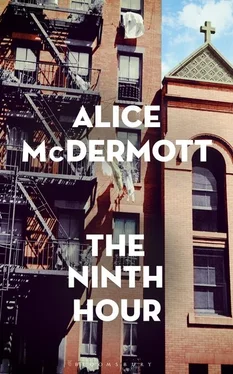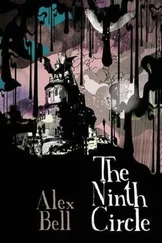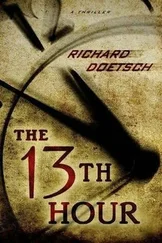He would find the place clean and well-ordered when he appeared.
She had a moment’s doubt that he would indeed appear, a moment’s fear that he had misunderstood her meaning, or disapproved of it, when she pressed the key into his hand. She dismissed both notions.
The Sisters said his own place was also neat as a pin. It was, she suspected, another kind of pretension, this immigrant reserve. A clean and well-ordered veneer over the trouble of a bedridden wife, a dead husband, over loneliness and worry.
The door was ajar. Through it, she heard what she knew was the sound of his footstep—although it might be the footstep of anyone—and then his shadow, hesitating. She stood. He was there. She opened the door just enough to admit him. Smell of the stable on his clothes, but also, now, the smell of alcohol and of pine soap, as if he had stopped before he came up. Stopped to take a drink. To wash his hands.
He took off his cap and smoothed back his hair, what there was of it. The bareness of his poor scalp moved her with pity, a sympathetic affection. It was an infant’s delicate skull; it was a reminder that he was not young.
In this light his eyes were merely brown, although in the sun she sometimes saw green and black and gold.
He put his hand to her chin and she touched his cheek, knowing her fingertips were rough. A sound arose from the cluttered backyard and rattled the kitchen window. It was the familiar tapping of city grit, or wind-lifted leaves, or maybe a pigeon’s wing against the glass. A sound that might once have filled her with fanciful notions: Jim’s breath in her ear, his hand on her hip, something restored to her.
As they both turned toward the noise, she saw his eyes catch the painting on her wall, the familiar image of Christ, sorrowful, compassionate, barely visible in the darkening oils but for the pale hand that gestured toward a heart threaded with thorns.
And then they both turned their eyes away from it.
“Are we alone?” he whispered.
She said, “We are.”
WE HAD ON OUR FATHER’S SIDE a great-great-aunt, Aunt Rose. A tiny woman, very old. We recall a velvet hat and a pale broadcloth suit, rose-colored perhaps, and maybe the smell of rosewater about her as she made her way into the house—one gloved hand steadying herself on the long server that had been our grandmother’s, one skimming the backs of the chairs that lined the dining table, skimming our cheeks as well as she encountered us, one by one. Our father behind her, carrying her bags, saying, “Step aside,” telling us, “Say ‘Good afternoon,’” “Say ‘Pardon me.’” Our father—the doorman’s son—banging her two suitcases against the chair legs and setting the porcelain in the china cabinet ringing.
This was in the drafty house in Hempstead where we grew up. It was an old house, red-shingled and white-trimmed, plagued with an endless series of tumble-down catastrophes that made our father in midlife a caricature of the hapless, city-bred, suburban homeowner. We recall him prowling through the rooms with a stepladder on his shoulder, with a hammer or a socket wrench in his hands, doing no good. Our mother, when she was well, always smiling indulgently, following him with her eyes.
The old Hempstead house. We recall the battered glass knob of the side door, our shoulders to its peeling paint. A nest of boots and shoes inside, no matter the season, a tattered rag rug, the dark basement-breath of heating oil and cinderblock and cold dirt. Then three steps up to the narrow kitchen—dark green countertops, black linoleum floor flecked with red, red cabinets, appliances of enamel and steel, scent of clove and cinnamon and sunlight and dust. The narrow passage to the dining room. Lace tablecloth, lace doilies, lace curtains at the window, and beyond it, a continuation of lace, the apple tree in full, wind-scattered bloom, or maybe a sudden shower of snow, as old Aunt Rose steadied herself, coming into the house, one gloved hand on the long server that had been our grandmother’s, one running along our cheeks.
Just where she had come from and why she had appeared remained uncertain. “Upstate,” we were told. “Because she is old,” we were told. She was given the guest room, and directed by our father, we followed her halting journey up the stairs with our hands poised at her elbows or at her hips. She trembled, we recall, either because of her great age or because of her delight at our elaborate courtesies.
The guest room on the third floor of the old Hempstead house was narrow beneath the eaves, painted yellow, white curtains at the window.
Downstairs again, our father told the story of Great-aunt Rose and Red Whelan. Up in Poughkeepsie this was, he said. Just after the Civil War. A knock at the door when the family was at dinner. Rose only a small child. A man invited in: red hair, red skin, scarred red flesh from neck to ear as if a plow had scraped his face. One leg and one arm, so that he, too, Red Whelan, made a halting climb to the upstairs room—tap of crutch on each stair tread, on the attic’s bare wood. Patrick, our great-grandfather, a young schoolteacher by then, standing silently in the room’s narrow doorway as Red Whelan was shown the bed, the washstand, a small desk, and a wide wing chair, all the family had done to prepare the place for him. The room where he would live out his days.
And Great-aunt Rose, still a child, holding his dinner in a covered dish.
When we were teenagers, brooding in our bedrooms, brooding or hungover, or just sleeping through an afternoon, as our mother used to do, our father would complain, his voice annoyed, bordering on angry, but amused also, because he, too, had been a reader, a brooder, and the phrase had been his own father’s refrain—“Hibernating up there like Red Whelan.”
Any redheaded, fat-faced, freckled Irishman was a regular Red Whelan.
Any houseguest who stayed too long was threatening to become a Red Whelan.
Any mention of old Aunt Rose’s long and lonely life included the forty-odd years she had devoted herself to Red Whelan, her brother’s substitute in the Civil War. A widowed spinster, our father called her. A married nun.
We carried the tea things upstairs. We carried her sparse dinner, only small bowls of mush: soups and applesauce and creamed farina. In the third-floor room, she blinked at us from her bed or from her chair, her face always dusted with powder, although it seemed to us then that she was dusted with dust.
And the Little Nursing Sisters of the Sick Poor standing by. “Aren’t you good?” they told us when we brought in the old lady’s tray or took it away. Sister Jeanne among them. Our favorite.
We knew them well, the Little Nursing Sisters. The order of nuns our mother had thought to join until—our father liked to say—she thought better of it.
We knew them from our own fevered mornings: waking to find their pale hands to our foreheads and to our cheeks, or seeing through our crusted eyes their serious faces within the white bonnets as they put a thermometer between our lips, commanded us not to bite it. We watched them float around our sickbeds, tugging and pulling with their short, clean hands until our night-tangled blankets and sheets were transformed into something clean again, and cool.
We knew them from all the long afternoons when we came home from school, hand to the glass knob of the battered side door, and found a nursing nun standing like a black-and-white beacon in the kitchen—her finger to her lips because our mother had once more taken to her shaded room to sleep off what they called her melancholy.
They arrived by taxi in those days, before their habits were amended to allow them enough peripheral vision to drive themselves. Our father scurried out to the curb to pay the fare.
Читать дальше










